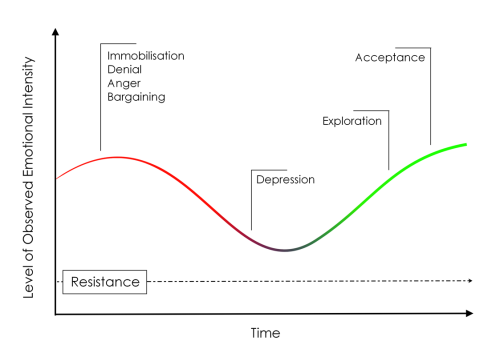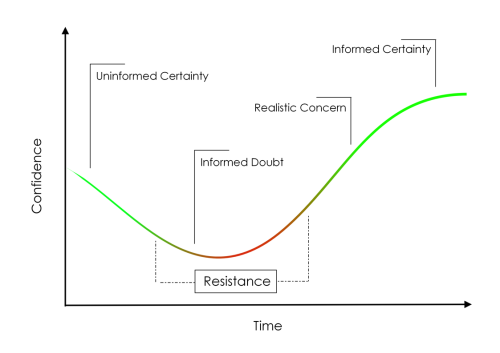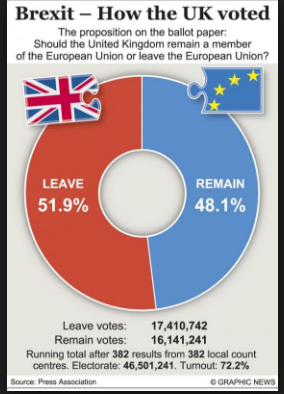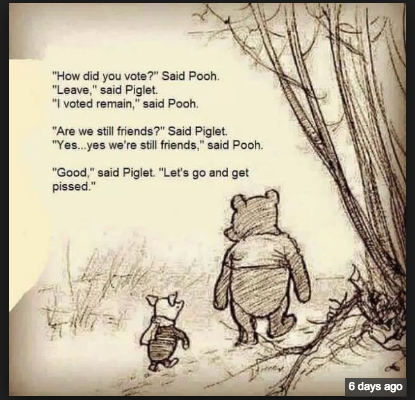By Elisabeth Goodman, 3rd July 2016
As someone who writes and gives talks about managing change, and trains and coaches people in how to lead change, I feel compelled to write about one of the most dramatic examples of change that 72% and more of the British electorate are currently experiencing.
I believe that the EU referendum illustrates, very poignantly, some truths about how people respond to change, whilst also exploding some commonly expounded myths about change.
Myth #1: People don’t like change. Correction: People do sometimes choose change.
“There were some things that had to be shaken up, and they have been” says Cliff Hampton, retired, living in Stroud (“Voices on the to rise”, The Observer, 3rd July, 2016, p.23)
I often hear the refrain, amongst change practitioners and people in general, that “people don’t like change”. However, the 52% who voted to leave did want change. Granted that some of them voted to return to a vision of former greatness that they felt we had lost when we first joined the EU – so in effect voting to reverse the change that they had not wanted at the time. But others voted to change because of their concerns about what is not working as a result of us being part of the EU: the bureaucracy, the lack of autonomy about how we allocate our money, the impact of seemingly uncontrolled immigration on a thinly stretched infrastructure (education, health, housing, jobs). They wanted to regain “control over their borders, their taxation system and their laws.” Gisela Stewart, The Observer, 3rd July 2016, p.33.
And yes, most of the 48% who voted to remain did so because they did not want to change. They voted against change because of their concerns about losing economically beneficial trade agreements and grants, employment legislation, freedom of movement for our workforce, and skilled workers from other countries, all of which they did not believe could be secured outside the EU. But some of the 48% who voted to remain, actually did so because they believed that to do so would provide a better platform for creating change within the EU.

Click here for more information about Elisabeth Goodman’s change management training with RiverRhee Consulting
Myth #2: Resistance is to be avoided. Correction: Resistance is natural and something to be understood.
Those leading change often talk about the need to avoid resistance: that it is as “a bad thing”. However, I believe that no-one witnessing the strength of emotion being experienced across the UK would want to suppress it. It is a natural thing and, if we are to heal as a nation, we each need to understand, appreciate and find a way to respond with empathy to our own and each other’s reactions. Facebook has been a seething bed of emotions through all of this, with many people trying to find explanations and ways to reconcile the impact on relations between friends who voted differently.
Politicians too, both in the UK and in Europe, in order to be effective in building the way forward, would be wise to listen to and ensure that they respond to all the anxieties being raised on either side of the voting divide. There are indications that the EU at least is starting to do so: “EU heads of state, reeling from the UK’s vote to leave…want to be seen to be responding to the new Eurosceptic mood, and some want a new “vision for Europe” document that distils the conflicting thinking.” The Observer, 3rd July 2016, page 2.
We are waiting for the resolution of the shake up in our political parties that has resulted from the referendum, to see how well our politicians respond to the voices of those who voted to leave and to remain.
Other truths about responses to change
I have been taken by surprise by the depths of my emotional response to this change, and it has certainly stirred up lots of emotion across the board. So this experience has reinforced some other truths about change.
Truth #1: People’s responses to change can have parallels with bereavement
Elisabeth Kübler-Ross first suggested this parallel, and reactions to the referendum result for those who voted to remain certainly reinforces it.

Negative change curve – from “The Effective Team’s Change Management Workbook”, RiverRhee Publishing, 2013
People who voted to remain woke up to the result in tears, feeling a real sense of loss. They have been angry, are denying that anyone will dare to activate article 50, or to reverse the thousands of legislative document involved. They are trying to bargain a way out through petitions signed by millions, and demonstrations attended by thousands.
Truth #2: Even those who welcome change will experience periods of doubt and symptoms of resistance
The most striking illustration of the doubts experienced by those who voted to leave was the realisation that they had been lied to, and the scale of the upheaval that leaving the EU would cause. Some have expressed regret at the way they voted (on both sides).

Positive change curve – from “The Effective Team’s Change Management Workbook”, RIverRhee Publishing, 2013
People moved from “uninformed certainty” that leaving the EU was the right thing to do, to “informed doubt” for example when leaders of the campaign said that the £350 million a week saved from our membership could not or would not in fact be rerouted to the NHS.
At some point we will all need to be ‘navigators’ of the change. Some form of certainty and control will help us to Be so.
“We woke up on Friday morning to shock and disbelief. But we now have to grasp the opportunity, roll up our sleeves and work together.” Clark Willis, chief executive of Anglia Farmers, The Observer, 3rd July, 2016, p. 44.
At some point we will all have to accept that there is no going back from the outcome of the referendum, and that we must get on with the job in hand. To do that we will need as much certainty, in the form of clear and complete and accurate information, as our politicians can give us.
If we can also be involved in some way in putting the new way of living and working in place, it will also help us to recover from the traumas that this referendum has caused to us individually, in our relationships, and in our communities.
One way to do this might be, as some have suggested, to hold a second referendum on the actual Brexit deal that is negotiated with the EU. People will be able to take a final informed decision, which will give it democratic legitimacy and make it easier for everyone to accept the outcome.
ABOUT THE AUTHOR
Elisabeth Goodman is the Owner and Principal Consultant at RiverRhee Consulting, a consultancy that specialises in “creating exceptional managers and teams”, with a focus on the Life Sciences. (We use training, facilitation, coaching, mentoring and consulting in our work with our clients.)
Elisabeth founded RiverRhee Consulting in 2009, and prior to that had 25+ years’ experience in the Pharmaceutical Industry in line management and internal training and consultancy roles supporting Information Management and other business teams on a global basis.
RiverRhee is a support supplier for One Nucleus, a quality assured training provider with Cogent Skills and a CPD provider for CILIP (Chartered Institute for Library and Information Professionals).
Elisabeth is accredited in Change Management, in Lean Sigma, in Belbin Team Roles, MBTI (Myers Briggs Type Indicator) and is an NLP (NeuroLinguistic Programming) Practitioner.
She is a member of CILIP and of APM (Association for Project Management) where she leads the Internal Collaboration theme of the Enabling Change SIG committee.



